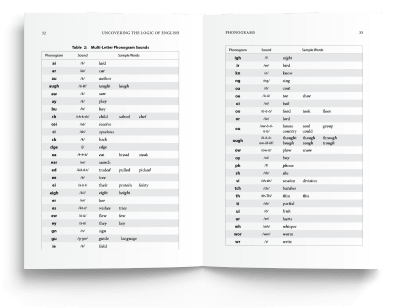Uncovering the Logic of English: From Memorization and Repetition to a World of Sounds

O-kay...what? I thought when I heard about a book called Uncovering the Logic of English by Denise Eide.
As an English Language Learner, I was taught that English made no sense. English was… well, English.
“English is a combination of Dutch, French, German, and many other languages,” I recalled many ELA teachers saying. “There aren't any rules. This is the way it is.”
A mantra.

The Missing Piece of a Forgotten Puzzle
Intrigued by the title, I decided to read Uncovering the Logic of English, a book that refutes the argument that English is an inconsistent language.
As I read through the pages, I realized a sad truth: I did not learn English correctly.
Memorizing words, guessing definitions, looking for synonyms, and watching Netflix® (with subtitles, of course) should not be the only way children or adults learn English. For me, Uncovering the Logic of English was the missing piece of a forgotten puzzle.
I did not know that a letter could have more than one sound or that you could use a combination of letters to “describe” a sound or multiple sounds. I learned English the hard way: Memorization and Repetition.
Because the only answer I was ever given was, “This is the way it is.”
Imagine coming from a background where every consonant needs to be accompanied by a vowel to make a sound, and then jump to a language that can have three consecutive consonants (Hello Thursday!) in a single word?
Oh boy, that was tough.

Phonemes, Phonograms, and Spelling Rules
In Uncovering the Logic of English, Denise addresses the 45 spoken phonemes in the English language, the 75 ways to spell them, and even spelling rules!
What if I knew this before? I thought while reading the book. It would have been easier to understand why English has so many silent E’s.
I was in the public school system for four years, and although I had excellent teachers - I would not be here if it wasn’t for them - they did not teach me simple things such as the 45 sounds in English or the rule about a silent E after a V.
Teach the Basics
Sometimes we teach English the same way we teach someone how to drive; you are so used to it - and it comes so naturally for you - that you forget to start with the most basic items.
“Okay, so R is for reversing, and D is for driving. Remember to slow down when you are making a turn,” said the instructor.
A few minutes later, the instructor got frustrated since the student did not indicate a right turn.
“Why did you not indicate?” asked the instructor with an exasperated voice.
“I...I do not know how to indicate,” replied the student.
The instructor assumed the student knew how to indicate because it is such a simple thing!
It wasn’t until I read this book that I became aware that S becomes a /z/ in words such as “is” and “his.”
I have been saying it right all this time, but I did not realize it until now!
Denise shows us that learning the phonetic approach from the beginning would help us better grasp the language, and I believe that is true. It took me a couple of years to differentiate a J from a Y.
English is not inconsistent, and to quote Lord Polonius:
Though this be madness, yet there is a method in’t.

English is Logical
Whether you are a child, a professional, a native speaker, or an English Language Learner, there is something there for you. I have spoken the language for fourteen years, and there was something in this book for me.
There is a method to English, and Uncovering the Logic of English proves it. I am recommending this book to every English Language Learner I meet!
Because this is the way English should be.
Logical.

